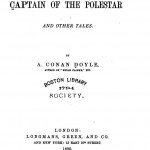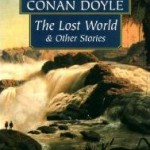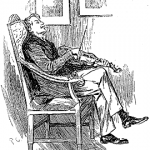From my boyhood I have had an intense and overwhelming conviction that my real vocation lay in the direction of literature. I have, however, had a most unaccountable difficulty in getting any responsible person to share my views. It is true that private friends have sometimes, after listening to my effusions, gone the length of remarking, “Really, Smith, that’s not half bad!” or, “You take my advice, old boy, and send that to some magazine!” but I have never on these occasions had the moral courage to inform my adviser that the article in question had been sent to well-nigh every publisher in London, and had come back again with a rapidity and precision which spoke well for the efficiency of our postal arrangements.
Had my manuscripts been paper boomerangs they could not have returned with greater accuracy to their unhappy dispatcher. Oh, the vileness and utter degradation of the moment when the stale little cylinder of closely written pages, which seemed so fresh and full of promise a few days ago, is handed in by a remorseless postman! And what moral depravity shines through the editor’s ridiculous plea of “want of space!” But the subject is a painful one, and a digression from the plain statement of facts which I originally contemplated.
From the age of seventeen to that of three-and-twenty I was a literary volcano in a constant state of eruption. Poems and tales, articles and reviews, nothing came amiss to my pen. From the great sea-serpent to the nebular hypothesis, I was ready to write on anything or everything, and I can safely say that I seldom handled a subject without throwing new lights upon it. Poetry and romance, however, had always the greatest attractions for me. How I have wept over the pathos of my heroines, and laughed at the comicalities of my buffoons! Alas! I could find no one to join me in my appreciation, and solitary admiration for one’s self, however genuine, becomes satiating after a time. My father remonstrated with me too on the score of expense and loss of time, so that I was finally compelled to relinquish my dreams of literary independence and to become a clerk in a wholesale mercantile firm connected with the West African trade.
Even when condemned to the prosaic duties which fell to my lot in the office, I continued faithful to my first love. I have introduced pieces of word-painting into the most commonplace business letters which have, I am told, considerably astonished the recipients. My refined sarcasm has made defaulting creditors writhe and wince. Occasionally, like the great Silas Wegg, I would drop into poetry, and so raise the whole tone of the correspondence. Thus what could be more elegant than my rendering of the firm’s instructions to the captain of one of their vessels. It ran in this way :–
“From England, Captain, you must steer a Course directly to Madeira, Land the casks of salted beef, Then away to Teneriffe. Pray be careful, cool, and wary With the merchants of Canary. When you leave them make the most Of the trade winds to the coast. Down it you shall sail as far As the land of Calabar, And from there you’ll onward go To Bonny and Fernando Po”—-
and so on for four pages. The captain, instead of treasuring up this little gem, called at the office next day, and demanded with quite unnecessary warmth what the thing meant, and I was compelled to translate it all back into prose. On this, as on other similar occasions, my employer took me severely to task–for he was, you see, a man entirely devoid of all pretensions to literary taste!
All this, however, is a mere preamble, and leads up to the fact that after ten years or so of drudgery I inherited a legacy which, though small, was sufficient to satisfy my simple wants. Finding myself independent, I rented a quiet house removed from the uproar and bustle of London, and there I settled down with the intention of producing some great work which should single me out from the family of the Smiths, and render my name immortal. To this end I laid in several quires of foolscap, a box of quill pens, and a sixpenny bottle of ink, and having given my housekeeper injunctions to deny me to all visitors, I proceeded to look round for a suitable subject.
I was looking round for some weeks. At the end of that time I found that I had by constant nibbling devoured a large number of the quills, and had spread the ink out to such advantage, what with blots, spills, and abortive commencements, that there appeared to be some everywhere except in the bottle. As to the story itself, however, the facility of my youth had deserted me completely, and my mind remained a complete blank; nor could I, do what I would, excite my sterile imagination to conjure up a single incident or character.
In this strait I determined to devote my leisure to running rapidly through the works of the leading English novelists, from Daniel Defoe to the present day, in the hope of stimulating my latent ideas and of getting a good grasp of the general tendency of literature. For some time past I had avoided opening any work of fiction because one of the greatest faults of my youth had been that I invariably and unconsciously mimicked the style of the last author whom I had happened to read. Now, however, I made up my mind to seek safety in a multitude, and by consulting ALL the English classics to avoid?? the danger of imitating any one too closely. I had just accomplished the task of reading through the majority of the standard novels at the time when my narrative commences.
It was, then, about twenty minutes to ten on the night of the fourth of June, eighteen hundred and eighty-six, that, after disposing of a pint of beer and a Welsh rarebit for my supper, I seated myself in my arm-chair, cocked my feet upon a stool, and lit my pipe, as was my custom. Both my pulse and my temperature were, as far as I know, normal at the time. I would give the state of the barometer, but that unlucky instrument had experienced an unprecedented fall of forty-two inches–from a nail to the ground– and was not in a reliable condition. We live in a scientific age, and I flatter myself that I move with the times.
Whilst in that comfortable lethargic condition which accompanies both digestion and poisoning by nicotine, I suddenly became aware of the extraordinary fact that my little drawing-room had elongated into a great salon, and that my humble table had increased in proportion. Round this colossal mahogany were seated a great number of people who were talking earnestly together, and the surface in front of them was strewn with books and pamphlets. I could not help observing that these persons were dressed in a most extraordinary mixture of costumes, for those at the end nearest to me wore peruke wigs, swords, and all the fashions of two centuries back; those about the centre had tight knee-breeches, high cravats, and heavy bunches of seals; while among those at the far side the majority were dressed in the most modern style, and among them I saw, to my surprise, several eminent men of letters whom I had the honour of knowing. There were two or three women in the company. I should have risen to my feet to greet these unexpected guests, but all power of motion appeared to have deserted me, and I could only lie still and listen to their conversation, which I soon perceived to be all about myself.
“Egad!” exclaimed a rough, weather-beaten man, who was smoking a long churchwarden pipe at my end of the table, “my heart softens for him. Why, gossips, we’ve been in the same straits ourselves. Gadzooks, never did mother feel more concern for her eldest born than I when Rory Random went out to make his own way in the world.”
“Right, Tobias, right!” cried another man, seated at my very elbow.
“By my troth, I lost more flesh over poor Robin on his island, than had I the sweating sickness twice told. The tale was well-nigh done when in swaggers my Lord of Rochester–a merry gallant, and one whose word in matters literary might make or mar. ‘How now, Defoe,’ quoth he, ‘hast a tale on hand?’ ‘Even so, your lordship,’ I returned. ‘A right merry one, I trust,’ quoth he. ‘Discourse unto me concerning thy heroine, a comely lass, Dan, or I mistake.’ ‘Nay,’ I replied, ‘there is no heroine in the matter.’ ‘Split not your phrases,’ quoth he; ‘thou weighest every word like a scald attorney. Speak to me of thy principal female character, be she heroine or no.’ ‘My lord,’ I answered, ‘there is no female character.’ ‘Then out upon thyself and thy book too!’ he cried. ‘Thou hadst best burn it!’–and so out in great dudgeon, whilst I fell to mourning over my poor romance, which was thus, as it were, sentenced to death before its birth. Yet there are a thousand now who have read of Robin and his man Friday, to one who has heard of my Lord of Rochester.”
“Very true, Defoe,” said a genial-looking man in a red waistcoat, who was sitting at the modern end of the table. “But all this won’t help our good friend Smith in making a start at his story, which, I believe, was the reason why we assembled.”
“The Dickens it is!” stammered a little man beside him, and everybody laughed, especially the genial man, who cried out, “Charley Lamb, Charley Lamb, you’ll never alter. You would make a pun if you were hanged for it.”
“That would be a case of haltering,” returned the other, on which everybody laughed again.
By this time I had begun to dimly realise in my confused brain the enormous honour which had been done me. The greatest masters of fiction in every age of English letters had apparently made a rendezvous beneath my roof, in order to assist me in my difficulties. There were many faces at the table whom I was unable to identify; but when I looked hard at others I often found them to be very familiar to me, whether from paintings or from mere description. Thus between the first two speakers, who had betrayed themselves as Defoe and Smollett, there sat a dark, saturnine corpulent old man, with harsh prominent features, who I was sure could be none other than the famous author of Gulliver. There were several others of whom I was not so sure, sitting at the other side of the table, but I conjecture that both Fielding and Richardson were among them, and I could swear to the lantern-jaws and cadaverous visage of Lawrence Sterne. Higher up I could see among the crowd the high forehead of Sir Walter Scott, the masculine features of George Eliott, and the flattened nose of Thackeray; while amongst the living I recognised James Payn, Walter Besant, the lady known as “Ouida,” Robert Louis Stevenson, and several of lesser note. Never before, probably, had such an assemblage of choice spirits gathered under one roof.







